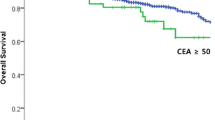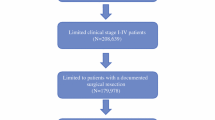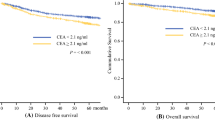Abstract
Background
Preoperative carcinoembryonic antigen (CEA) has yet to be used as a prognostic or adjuvant chemotherapy factor for colorectal cancer (CRC).
Methods
This retrospective cohort study included all stage I–III CRC patients with different preoperative serum CEA levels (≤ 5, 5–10, and > 10 ng/ml) at a single center between 1995 and 2010. Propensity score matching was performed in a 1:1 ratio between the two elevated CEA groups (5–10 ng/ml and > 10 ng/ml) and in a 1:2 ratio between the elevated and non-elevated groups (≤ 5 ng/ml), with a caliper of 0.05.
Results
After exclusion and matching, 3857 patients had preoperative CEA levels ≤ 5 ng/ml, 1121 patients had CEA levels between 5 and 10 ng/ml, and 1121 patients had CEA levels > 10 ng/ml. Elevated preoperative CEA showed an increased risk of overall survival (5–10 ng/ml: hazard ratio [HR] 1.376; > 10 ng/ml: HR 1.523; both p < 0.001), cancer-specific survival (5–10 ng/ml: HR 1.404; > 10 ng/ml: HR 1.712; both p < 0.001), and recurrence free interval (5–10 ng/ml: HR 1.190; > 10 ng/ml: HR 1.468; both p < 0.05). Patients with negative lymph node staging (LNs) and CEA > 10 ng/ml, as well as those with positive LNs and CEA ≤ 5 ng/ml, showed similar overall survival (5-year survival: 72% vs. 69%; p = 0.542) and recurrence free intervals (19.9 vs. 21.72 months; p = 0.662).
Conclusions
A preoperative CEA level can be an independent prognostic factor for stage I–III CRC after curative resection. Patients with negative LNs and preoperative CEA level > 10 ng/ml should be considered for intensive follow-up or adjuvant chemotherapy.


Similar content being viewed by others
References
Ferlay J, Shin HR, Bray F, Forman D, Mathers C, Parkin DM. Estimates of worldwide burden of cancer in 2008: GLOBOCAN 2008. Int. J. Cancer. 2010;127(12):2893–917.
Jemal A, Bray F, Center MM, Ferlay J, Ward E, Forman D. Global cancer statistics. CA Cancer J. Clin. 2011;61(2):69–90.
Goldstein MJ, Mitchell EP. Carcinoembryonic antigen in the staging and follow-up of patients with colorectal cancer. Cancer Invest. 2005;23(4):338–51.
Thompson JA, Grunert F, Zimmermann W. Carcinoembryonic antigen gene family: molecular biology and clinical perspectives. J. Clin. Lab. Anal. 1991;5(5):344–366.
Hammarstrom S. The carcinoembryonic antigen (CEA) family: structures, suggested functions and expression in normal and malignant tissues. Semin. Cancer Biol. 1999;9(2):67–81.
Wanebo HJ, Rao B, Pinsky CM, et al. Preoperative carcinoembryonic antigen level as a prognostic indicator in colorectal cancer. New Engl. J. Med. 1978;299(9):448–451.
Wolmark N, Fisher B, Wieand HS, et al. The prognostic significance of preoperative carcinoembryonic antigen levels in colorectal cancer. Results from NSABP (National Surgical Adjuvant Breast and Bowel Project) clinical trials. Ann. Surg. 1984;199(4):375.
Scott NA, Wieand HS, Moertel CG, Cha SS, Beart RW, Lieber MM. Colorectal cancer: Dukes’ stage, tumor site, preoperative plasma CEA level, and patient prognosis related to tumor DNA ploidy pattern. Arch. Surg. 1987;122(12):1375–1379.
Compton C, Fenoglio-Preiser CM, Pettigrew N, Fielding LP. American joint committee on cancer prognostic factors consensus conference: colorectal working group. Cancer. 2000; 88(7):1739–57.
Moreno García V, Cejas P, Codesido MB, et al. Prognostic value of carcinoembryonic antigen level in rectal cancer treated with neoadjuvant chemoradiotherapy. Int. J. Colorectal Dis. 2009;24(7):741–748.
Park IJ, Choi G-S, Lim KH, Kang BM, Jun SH. Serum carcinoembryonic antigen monitoring after curative resection for colorectal cancer: clinical significance of the preoperative level. Ann. Surg. Oncol. 2009;16(11):3087–3093.
Sun L-C, Chu K-S, Cheng S-C, et al. Preoperative serum carcinoembryonic antigen, albumin and age are supplementary to UICC staging systems in predicting survival for colorectal cancer patients undergoing surgical treatment. BMC Cancer. 2009;9(1):288.
Huh JW, Oh BR, Kim HR, Kim YJ. Preoperative carcinoembryonic antigen level as an independent prognostic factor in potentially curative colon cancer. J. Surg. Oncol. 2010;101(5):396–400.
Kim TH, Chang HJ, Kim DY, et al. Pathologic nodal classification is the most discriminating prognostic factor for disease-free survival in rectal cancer patients treated with preoperative chemoradiotherapy and curative resection. Int. J. Radiat. Oncol. Biol. Phys. 2010;77(4):1158–1165.
Yeh CY, Hsieh PS, Chiang JM, et al. Preoperative carcinoembryonic antigen elevation in colorectal cancer. Hepatogastroenterology. 2011;58(109):1171–6.
Kirat HT, Ozturk E, Lavery IC, Kiran RP. The predictive value of preoperative carcinoembryonic antigen level in the prognosis of colon cancer. Am. J. Surg. 2012;204(4):447–52.
Kim CW, Yoon YS, Park IJ, Lim S-B, Yu CS, Kim JC. Elevation of preoperative s-CEA concentration in stage IIA colorectal cancer can also be a high risk factor for stage II patients. Ann. Surg. Oncol. 2013;20(9):2914–2920.
Lee SY, Jo JS, Kim HJ, et al. Clinicopathologic features and oncologic outcomes of colorectal cancer patients with extremely high carcinoembryonic antigen. Int. J. Colorectal Dis. 2015;30(1):63–69.
Thirunavukarasu P, Talati C, Munjal S, Attwood K, Edge SB, Francescutti V. Effect of incorporation of pretreatment serum carcinoembryonic antigen levels into AJCC staging for colon cancer on 5-year survival. JAMA Surg. 2015;150(8):747–755.
Li Destri G, Rubino AS, Latino R, et al. Preoperative carcinoembryonic antigen and prognosis of colorectal cancer. An independent prognostic factor still reliable. Int. Surg. 2015;100(4):617–625.
Becerra AZ, Probst CP, Tejani MA, et al. Evaluating the prognostic role of elevated preoperative carcinoembryonic antigen levels in colon cancer patients: results from the National Cancer Database. Ann. Surg. Oncol. 2016;23(5):1554–1561.
Booth S, King J, Leonard J, Dykes P. Serum carcinoembryonic antigen in clinical disorders. Gut. 1973;14(10):794–799.
Fang M, Wang S, Zheng Y, et al. Prognostic and predictive significance of plasma hepatocyte growth factor and carcinoembryonic antigen in non-small lung cancer after surgery. Eur. Rev. Med. Pharmacol. Sci. 2014;18(3):398–403.
Ruibal MA. CEA serum levels in non-neoplastic disease. Int. J. Biol. Mark. 1991;7(3):160–166.
Fukuda I, Yamakado M, Kiyose H. Influence of smoking on serum carcinoembryonic antigen levels in subjects who underwent multiphasic health testing and services. J. Med. Syst. 1998;22(2):89–93.
Bulut, I., P. Arbak, A. Coskun, et al., Comparison of serum CA 19.9, CA 125 and CEA levels with severity of chronic obstructive pulmonary disease. Med. Princ. Pract., 2009. 18(4): p. 289–293.
Sturgeon C, Lai L, Duffy M. Serum tumour markers: how to order and interpret them. BMJ. 2009;339(7725):852–858.
Graham RA, Wang S, Catalano PJ, Haller DG. Postsurgical surveillance of colon cancer: preliminary cost analysis of physician examination, carcinoembryonic antigen testing, chest x-ray, and colonoscopy. Ann. Surg. 1998;228(1):59.
Pfister DG, Benson AB III, Somerfield MR. Surveillance strategies after curative treatment of colorectal cancer. New Engl. J. Med. 2004;350(23):2375–2382.
Konishi T, Shimada Y, Hsu M, et al., Association of preoperative and postoperative serum carcinoembryonic antigen and colon cancer outcome. JAMA Oncol. 2018;4(3):309–315.
Tokodai K, Narimatsu H, Nishida A, et al. Risk factors for recurrence in stage II/III colorectal cancer patients treated with curative surgery: the impact of postoperative tumor markers and an infiltrative growth pattern. J. Surg. Oncol. 2016;114(3):368–74.
Thirunavukarasu P, Talati C, Munjal S, Attwood K, Edge SB, Francescutti V. Effect of incorporation of pretreatment serum carcinoembryonic antigen levels into AJCC staging for colon cancer on 5-year survival. JAMA Surg. 2015;150(8):747–55.
Ozawa H, Kotake K, Hosaka M, et al. Incorporation of serum carcinoembryonic antigen levels into the prognostic grouping system of colon cancer. Int. J. Colorectal Dis. 2017;32(6):821–829.
Dallas MR, Liu G, Chen W-C, et al. Divergent roles of CD44 and carcinoembryonic antigen in colon cancer metastasis. FASEB J. 2012;26(6):2648–2656.
Takagawa R, Fujii S, Ohta M, et al. Preoperative serum carcinoembryonic antigen level as a predictive factor of recurrence after curative resection of colorectal cancer. Ann. Surg. Oncol. 2008;15(12):3433–9.
André T, Boni C, Navarro M, et al. Improved overall survival with oxaliplatin, fluorouracil, and leucovorin as adjuvant treatment in stage II or III colon cancer in the MOSAIC trial. J. Clin. Oncol. 2009;27(19):3109–3116.
Gill S, Loprinzi CL, Sargent DJ, et al. Pooled analysis of fluorouracil-based adjuvant therapy for stage II and III colon cancer: who benefits and by how much? J Clin Oncol. 2004;22(10):1797–806.
Quasar Collaborative Group, Gray R, Barnwell J, McConkey C, Hills RK, Williams NS, et al. Adjuvant chemotherapy versus observation in patients with colorectal cancer: a randomised study. The Lancet. 2007;370(9604):2020–2029.
Benson AB III, Schrag D, Somerfield MR, et al. American Society of Clinical Oncology recommendations on adjuvant chemotherapy for stage II colon cancer. J. Clin. Oncol. 2004;22(16):3408–3419.
Kang HY, Choe EK, Park KJ, Lee Y. Factors requiring adjustment in the interpretation of serum carcinoembryonic antigen: a cross-sectional study of 18,131 healthy nonsmokers. Gastroenterol. Res. Pract. 2017;2017:9858931.
Sun L, MingjieXu LW, Wang Y, Wang Y. Increase of carcinoembryonic antigen level in serum is associated with metabolic factors and lifestyle. Int. J. New Technol. Res. 2016;2(4):79–84.
Sun C, Deng Y, Zhou H, Hu ZQ. Risk factors for the development of metachronous bone metastasis in colorectal cancer patients after curative resection. Int. J. Surg. 2015;21:145–9.
Funding
This work was supported by the Chang Gung Medical Research Fund (CORPG3F032).
Author information
Authors and Affiliations
Contributions
WST and SHH had full access to all the data in the study and take responsibility for the integrity of the data and accuracy of the data analysis. Study concept and design: WST Acquisition of data: All authors. Drafting of the manuscript: WST and SHH. Critical revision of the manuscript for important intellectual content: WST and SHH. Statistical analysis: WST and SHH. Administrative, technical, or material support: WST. Study supervision: WST.
Corresponding author
Ethics declarations
Disclosures
Part of the data included in this study was presented as an oral presentation at the International Digestive Disease Forum held in Hong Kong, 9–10 June 2018.
Additional information
Publisher's Note
Springer Nature remains neutral with regard to jurisdictional claims in published maps and institutional affiliations.
Rights and permissions
About this article
Cite this article
Huang, SH., Tsai, WS., You, JF. et al. Preoperative Carcinoembryonic Antigen as a Poor Prognostic Factor in Stage I–III Colorectal Cancer After Curative-Intent Resection: A Propensity Score Matching Analysis. Ann Surg Oncol 26, 1685–1694 (2019). https://doi.org/10.1245/s10434-019-07184-3
Received:
Published:
Issue Date:
DOI: https://doi.org/10.1245/s10434-019-07184-3




